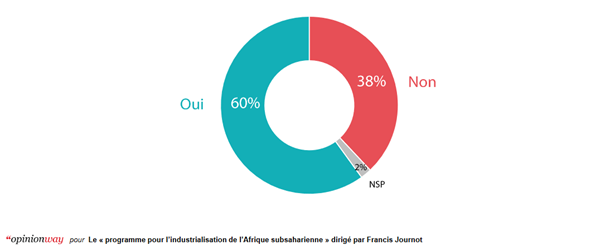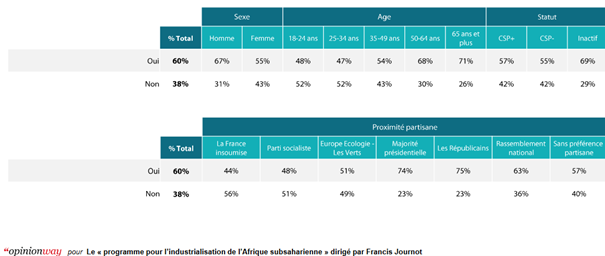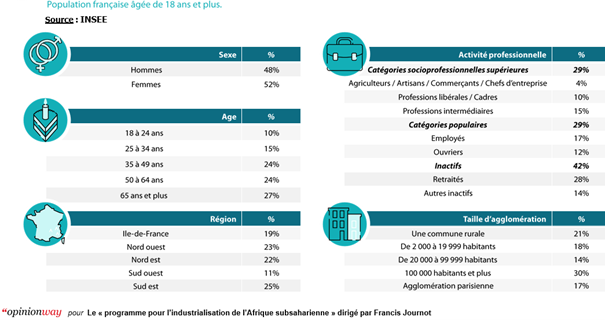Poll: 60% of French people want development aid for sub-Saharan Africa to be replaced by a real industrialization program

France's official development assistance (ODA) budget for the world was 15.9 billion euros in 2022 and should reach 21.4 billion euros in 2025, a large share of which usually goes to Africa. But sub-Saharan Africans deplore the absence of development for 60 years, and often an increase in poverty. On the neighboring continent, France's public deficits are exploding, and French taxpayers are calling for greater efficiency in the use of their taxes, including those devoted to official development assistance to Africa. A model of inclusive capitalism, with a structured industrialization program and a fund backed by public and private capital, could avert the predicted humanitarian and migratory chaos.
The "Programme pour l'industrialisation de l'Afrique subsaharienne en moins de 20 ans" (Program for the industrialization of sub-Saharan Africa in less than 20 years), directed by Francis Journot, commissioned the opinionWay research institute to survey the French population.

In your opinion, should official development assistance to sub-Saharan Africa be replaced by a more privately financed industrialization program?




Any publication of the survey, in whole or in part, must use the following full wording and may not be dissociated.
Analysis by the polling institute

With a contribution of $15.9 billion in 2022, France is one of the world's leading donors of official development assistance, and the total amount paid out by the global community to sub-Saharan African countries was close to $30 billion (Source: OECD). When asked about the possibility of replacing public aid with an industrialization program more open to private capital, a majority of those interviewed expressed their support.
60% of French people are in favor of this paradigm shift, compared to 38% who do not want to see official development assistance to sub-Saharan Africa replaced by more privately-funded programs. Support for this proposal is in the minority among the younger generations (47% of the under-35s versus 52% who are opposed). However, support is growing among the older generations: 54% of 35-49 year-olds, 68% of 50-64 year-olds and 71% of seniors aged 65 and over.
Regardless of income level, a majority of French people are in favor of replacing public development aid with a program giving greater scope to the private sector. However, support is strongest among the most financially well-off households. It stands at 56% among French households earning less than €1,000 per month, and climbs to 69% among households earning €3,500 net per month or more. Political preferences are the criterion producing the greatest differences on the question asked. Support for the proposed measure is particularly strong among supporters of the presidential majority (74%) and Republicans (75%).
It also remains clearly in the majority among supporters of the Rassemblement National (63%) and among French people expressing no partisan preference (57%). Opinion on the measure is less positive among left-wing sympathizers, who are often more attached to public programs. However, a significant proportion of them are in favor of the measure: this is the case for 44% of Insoumis supporters, 48% of Socialists and even 51% of Ecologists.
The model of inclusive capitalism we advocate could avert humanitarian chaos.
ODA policy has failed to industrialize and develop the region sufficiently, or to curb economic migration to the EU. Immigration from West Africa rose by 541% in the first 2 months of 2024. According to the World Bank, "forecasts for 2030 indicate that 9 out of 10 people living in extreme poverty will be in sub-Saharan Africa", and current policies will create "at most 100 million new jobs over the next 20 years, rather than the 450 million that Africa needs". With a population of 2.1 billion in 2050 and 4 billion in 2100, hundreds of millions of people in sub-Saharan Africa could succumb to hunger or be forced into exile.
According to our simulations, it will be necessary to generate annual growth of between 8 and 12% for 2 decades.
Popular with African populations and entrepreneurs, but also with the diaspora and a majority of French people, the industrialization program could also convince industrial leaders to transfer part of their production from China to sub-Saharan Africa. Many local companies would be created, forming new ecosystems. Scrupulous management of the dedicated fund would enable capital to be remunerated. Industrialization could deliver annual growth of between 8 and 12% for 2 decades, and the hundreds of millions of non-formal jobs that sub-Saharan Africa needs. Societal evolution would lead to a decline in demographics, and humanitarian chaos could be avoided. This paradigm shift would also benefit European countries and companies.
Francis Journot is a consultant and entrepreneur. He directs the Program for the Industrialization of Sub-Saharan Africa in less than 20 years or Africa Atlantic Axis (AAA), and conducts research for the International Convention for a Global Minimum Wage. He also runs the Collectivité Nationale website